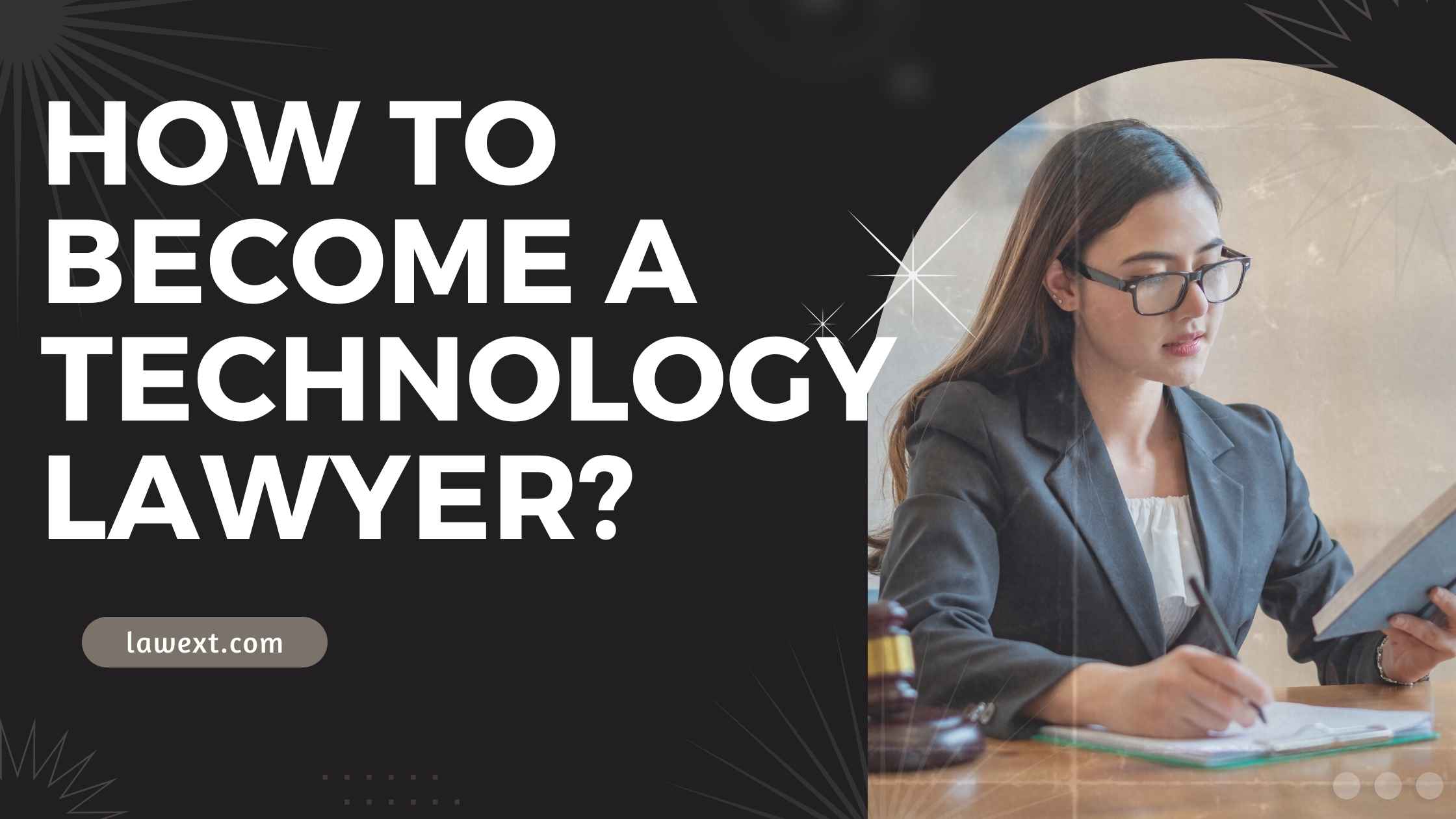How to Become a Technology Lawyer?

To become a technology lawyer, you need to complete a law degree and specialize in technology-related legal issues. In this field, knowledge of intellectual property laws, data protection regulations, and technology licensing is essential.
Table of Contents
How to Become a Technology Lawyer? developing strong research, analytical, and communication skills will greatly benefit your career as a technology lawyer. With the increasing reliance on technology in various industries, there is a growing demand for lawyers who can navigate complex technology-related legal matters.
Whether it involves advising clients on e-commerce regulations, drafting technology contracts, or representing clients in technology-related disputes, a career as a technology lawyer offers numerous opportunities for growth and specialization. Stay updated with the latest developments in technology and the legal landscape to continuously enhance your expertise in this field.
Credit: www.juriseducation.com
Why Pursue A Career As A Technology Lawyer?
Are you considering a career in law and have a passion for technology? If so, becoming a technology lawyer could be the perfect path for you. In this digital age, technology is advancing at a rapid pace and disrupting industries across the board. As a result, there is a growing demand for legal professionals who specialize in the complex legal issues that arise in the world of technology. In this article, we will explore why pursuing a career as a technology lawyer can be a rewarding and lucrative choice.
The Growing Demand For Technology Lawyers
Technology is an integral part of our daily lives, influencing how we work, communicate, and even entertain ourselves. With advancements in fields such as artificial intelligence, cybersecurity, and e-commerce, businesses are increasingly relying on technology to stay competitive. However, with new technology comes new legal challenges, and organizations need experienced legal professionals to navigate these complexities.
In recent years, the demand for technology lawyers has skyrocketed. From start-ups to multinational corporations, businesses of all sizes are seeking legal expertise to handle matters such as intellectual property rights, data protection, and privacy regulations. Additionally, the rise of emerging technologies like blockchain and the Internet of Things has created a whole new set of legal considerations that only technology lawyers can effectively address.
Lucrative Opportunities In The Field
Not only is there a high demand for technology lawyers, but the field also offers lucrative opportunities. As technology continues to shape the global economy, companies are willing to invest significantly in legal expertise to protect their assets and mitigate risks. This high demand for specialized knowledge translates into attractive salaries and benefits for technology lawyers.
Moreover, technology lawyers have the opportunity to work with cutting-edge tech companies and start-ups, allowing them to be at the forefront of innovation. This exposure to emerging technologies can further enhance their skills and expertise, making them highly sought after in the legal industry.
Furthermore, the complex nature of technology law means that there is a limited pool of professionals with the necessary expertise. As a result, technology lawyers often enjoy a position of scarcity, where they can command higher fees and negotiate favorable terms.
In conclusion, a career as a technology lawyer offers numerous advantages, from being at the forefront of innovation to enjoying a high-demand job market. If you have a passion for law and a keen interest in technology, this field could be the perfect fit for you. Now let’s explore the steps you can take to become a successful technology lawyer in our next section.

Educational Requirements For Becoming A Technology Lawyer
Becoming a technology lawyer requires a comprehensive educational background in law, with a specific focus on technology-related legal areas. Here are the steps and educational requirements to consider when pursuing a career in technology law:
Obtaining A Law Degree
Earning a bachelor’s degree is the first step towards becoming a technology lawyer. While there is no specific undergraduate major required, it is beneficial to choose a major that emphasizes critical thinking, research, and communication skills. After completing the bachelor’s degree, aspiring technology lawyers need to pursue a Juris Doctor (J.D.) degree from an accredited law school. This typically takes three years of full-time study. During law school, students can focus on technology law courses and programs, gaining relevant knowledge and skills in this specialized field.
Specializing In Technology Law
After completing law school, lawyers aspiring to specialize in technology law can pursue additional education and certifications to enhance their expertise in this area. Taking specialized courses related to technology law and intellectual property can provide a deeper understanding of legal issues in technology, cybersecurity, data privacy, and intellectual property rights. Additionally, obtaining certification in technology law or related areas can demonstrate a lawyer’s commitment to staying current in this rapidly evolving field.
Developing The Necessary Skills
Becoming a technology lawyer requires a unique set of skills that combine legal expertise with a deep understanding of the ever-evolving world of technology. Whether you are just starting your legal career or looking to transition into this exciting field, developing these skills is crucial for success. In this section, we will explore the key skills you need to become a proficient technology lawyer and navigate the complexities of this rapidly changing industry.
Understanding Technology And Its Implications
As a technology lawyer, having a solid understanding of the advancements and trends in technology is essential. This knowledge allows you to effectively advise clients on the legal implications of using various technologies and can help you navigate the complex landscape of intellectual property, privacy, and cybersecurity.
Here are some ways to develop your understanding of technology:
- Stay updated with the latest tech news and developments
- Follow influential technology blogs and podcasts
- Attend conferences and industry events
- Take relevant technology courses or certifications

Strong Communication And Negotiation Skills
Being a successful technology lawyer entails more than just understanding the legal aspects of technology. You also need to be an excellent communicator and negotiator to effectively represent your clients’ interests and navigate complex legal situations.
Here are some key communication and negotiation skills to focus on:
- Effective written and verbal communication
- Active listening and understanding client needs
- Strong persuasion and negotiation skills
- Ability to explain complex legal concepts in a clear and concise manner
- Collaboration and teamwork
Developing these skills can be achieved through practice and continuous learning. Communication and negotiation workshops, mock negotiations, and working closely with senior technology lawyers can help enhance your skills in these areas.
Gaining Experience In The Field
Building a successful career as a technology lawyer involves gaining practical experience in the field. Taking part in internships and legal clinics, as well as working on technology-related cases, can provide invaluable opportunities for aspiring technology lawyers to enhance their skills and knowledge. This section explores how internships and legal clinics, as well as working on technology-related cases, can contribute to becoming a well-rounded technology lawyer.
Internships And Legal Clinics
Internships and legal clinics offer aspiring technology lawyers the chance to gain hands-on experience in the legal field while working alongside experienced professionals. These opportunities provide a valuable learning experience and allow individuals to apply their theoretical knowledge to real-world scenarios. Throughout internships and legal clinics, aspiring technology lawyers have the chance to develop essential skills, such as research, client communication, and drafting legal documents.
During internships, individuals are often placed in different departments within a law firm or a technology-related organization. This exposure allows them to explore various areas of technology law and find their specific areas of interest. Internships typically last for a few months and provide a structured learning environment where new professionals can learn from seasoned lawyers and gain insights into the day-to-day tasks and challenges they may face.
Legal clinics, on the other hand, offer aspiring technology lawyers the opportunity to work directly with clients and handle real cases. These clinics are often run by universities or law schools and provide free legal services to individuals or organizations who may not have the means to hire a lawyer. Through legal clinics, aspiring technology lawyers can work on technology-related cases and gain practical experience in handling legal issues that arise in the technology sector.
Working On Technology-related Cases
Another way aspiring technology lawyers can gain experience in the field is by actively seeking opportunities to work on technology-related cases. This can be done by joining law firms that specialize in technology law or seeking out pro bono cases with technology-focused legal organizations. Working on technology-related cases allows individuals to further deepen their understanding of the legal issues and challenges faced by businesses operating in the technology sector.
When working on technology-related cases, aspiring technology lawyers have the chance to research and analyze complex legal frameworks, draft legal documents, and engage in negotiations. This hands-on experience provides invaluable insights into the practical application of technology law and helps aspiring technology lawyers develop the critical thinking and problem-solving skills necessary for success in their careers.
In conclusion, gaining experience in the field of technology law is essential for aspiring professionals. By taking part in internships and legal clinics, as well as working on technology-related cases, individuals can enhance their skills, build a strong foundation of practical knowledge, and position themselves for a successful career as a technology lawyer.
Building A Successful Career As A Technology Lawyer
Building a successful career as a technology lawyer requires a deep understanding of legal principles and expertise in emerging technologies. By staying updated on industry trends and continuously expanding your knowledge, you can position yourself for growth and impact in this dynamic field.
Technology law is a rapidly evolving field that combines legal expertise with a deep understanding of technological innovations. To succeed as a technology lawyer, one must stay abreast of the latest advancements in the tech industry, build a strong professional network, and continuously enhance their skills.
Networking And Building Relationships
Networking is essential for aspiring technology lawyers. Building relationships with professionals in the technology and legal sectors can open doors to new opportunities and provide valuable insights. Attending industry events, joining relevant associations, and using social media platforms can help in establishing and nurturing these connections.
Continuous Learning And Staying Updated With Technology Advancements
Continuous learning is crucial for staying relevant in the dynamic field of technology law. Law professionals should prioritize gaining knowledge about emerging technologies, such as artificial intelligence, blockchain, and data privacy regulations. Subscribing to industry publications, attending relevant workshops, and pursuing specialized certifications can support ongoing skill development.

Credit: www.blg.com
Conclusion
Becoming a technology lawyer entails a mix of legal knowledge and technological expertise. By mastering the industry’s complexities and staying updated with the latest developments, aspiring technology lawyers can pave their way to success. With dedication, continuous learning, and a firm grasp on legal and tech realms, one can thrive in this dynamic field.
Introducing Jonah Plum, a legal luminary whose journey through the corridors of justice has been intertwined with the eloquence of the written word. Born and raised in the vibrant city of Seattle, Washington, Jonah's early fascination with language and debate laid the foundation for a remarkable career in law.
Jonah's scholarly odyssey began at Harvard Law School, where they immersed themselves in the study of jurisprudence, honing their analytical prowess and legal acumen. Armed with a law degree, they entered the legal arena, navigating courtrooms and boardrooms with a fervor for justice. Yet, it was the realization of the transformative power of the written word that led Jonah to pivot from legal briefs to the world of blogging.
A digital advocate in the truest sense, Jonah recognized the need for demystifying legal concepts and making them accessible to a broader audience. This blog, a virtual repository of legal insights, transcends geographical boundaries, connecting with a global readership hungry for clarity amidst legal complexities.
Beyond the black letter of the law, Jonah delves into the human stories that underscore the legal landscape. Their writing goes beyond legal analysis, weaving narratives that humanize the law, shedding light on its impact on individuals and society.






